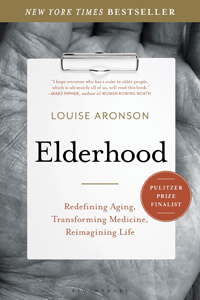 Louise Aronson, Elderhood: Redefining Aging, Transforming Medicine, and Reimagining Life (New York: Bloomsbury, 2019), 449pp.
Louise Aronson, Elderhood: Redefining Aging, Transforming Medicine, and Reimagining Life (New York: Bloomsbury, 2019), 449pp.
Everyone has a story about people living longer. My wife's mother, for example, is almost 97 and lives by herself in a small house that's near her family. Whereas in 1900 the average life expectancy for an American was forty-six years, today it is seventy-nine. It's strange, then, even infuriating, that in our medicine, health care, and larger culture, there's so little constructive attention given to the last third of life. Louise Aronson, a Harvard-trained gerontologist, brings thirty years of scholarship, experience and passion to this subject. Her book was a finalist for a Pulitzer Prize and was on a number of bestseller lists like the NYTs.
Aronson argues for nothing less than a "radical transformation" in how we understand and address elderhood. Her book is first and foremost an unsparing critique of medical culture and health care, in particular how they typically ignore the unique characteristics of old age altogether, and treat it with a reductionistic and narrow-minded approach that offers little more than science and technology. What we need is a much more comprehensive and wholistic approach, and toward that end, Aronson devotes much of her book to history, literature, philosophy, anthropology, sociology, and, like Oliver Sacks, personal memoir—numerous case studies and personal experiences as a physician, care giver to her aging father, and as a patient herself during a crisis of burnout.
Despite the powerful cultural narratives in which old age is "dreaded, denigrated, neglected, and denied," there's at least some good news in the many stereotypes that Aronson deconstructs. Most people self-report that they are happiest in their sixties. In a TED talk that has garnered more than 11 million views, Robert Waldinger of Harvard specifies exactly what makes people truly happy: meaningful relationships and a sense of purpose ("a reason to get up in the morning"). So, stay in the game. Embrace old age. Reach out and connect. There is more sugar at the bottom of the cup.
For more on this topic, see my reviews of the following books. Wendy Lustbader, Life Gets Better; The Unexpected Pleasures of Growing Older (New York: Penguin, 2011), 243pp. Karl Pillemer, 30 Lessons for Living; Tried and True Advice from the Wisest Americans (New York: Hudson Street Press, 2011), 271pp. H. Gilbert Welch, Less Medicine, More Health: 7 Assumptions That Drive Too Much Health Care (Boston: Beacon Press, 2015), 218pp. Atul Gawande, Being Mortal; Medicine and What Matters in the End (New York: Metropolitan Books, 2014), 282pp.
Dan Clendenin: dan@journeywithjesus.net


